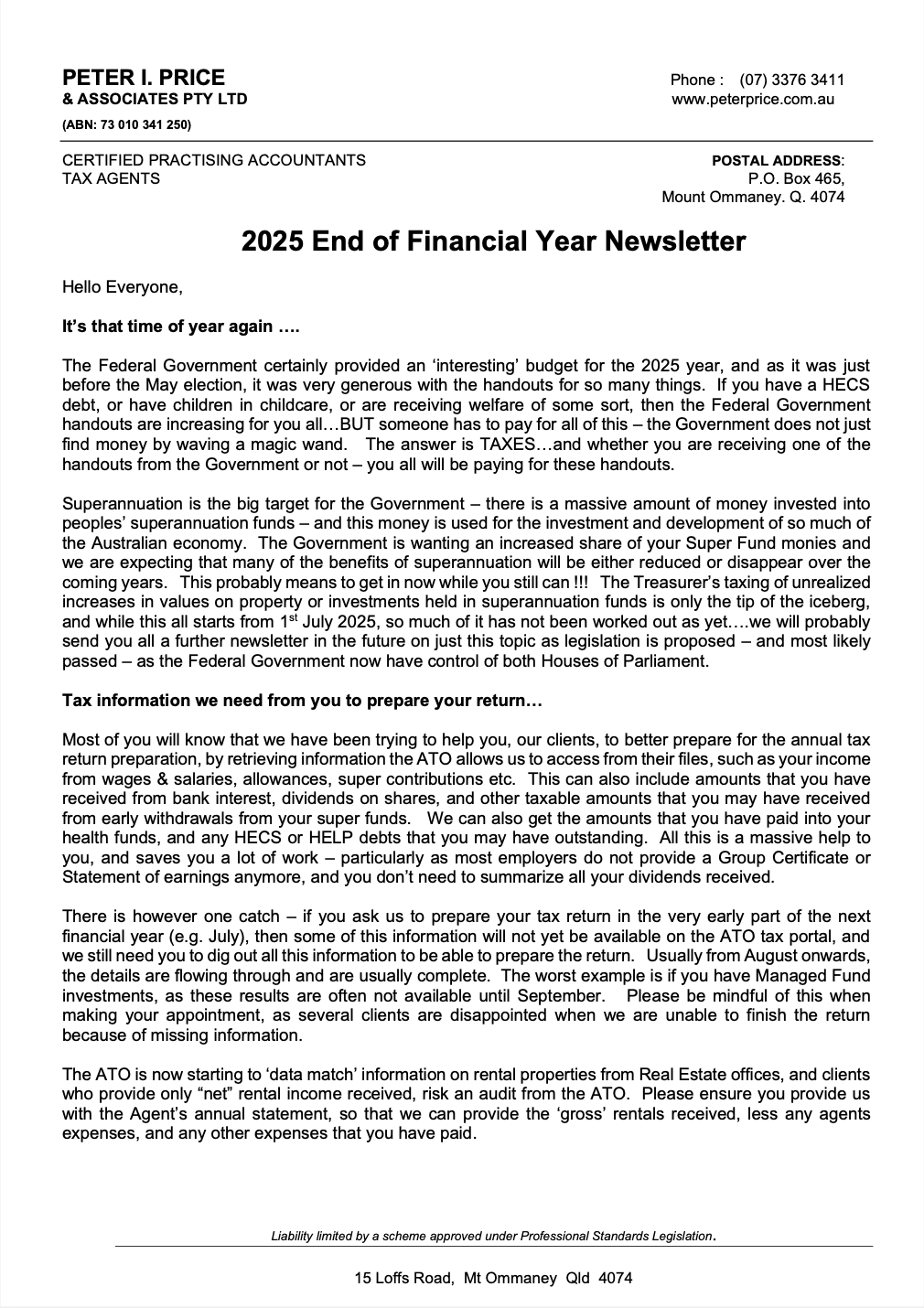30 June 2025 - Tax Checklist - Small (and Micro) Business

.
This article is designed to be used as a prompt together with our associated checklist of action items, before 30 June 2025.
Bad debts
Write-off bad debts (physically in books)
Director fees and employee bonuses
Confirm commitments to pay director fees and employee bonuses (e.g., resolutions in place and employees noticed). PAYG withholding must be withheld when paid. Alternately, cease directors fees and draw down existing credit loans if the company has losses. Single touch payroll requirements and BAS return deadlines mean attention before reporting.
Donations
Bring forward planned donations (and have the highest earning member of the family pay for them). Keep in mind donations cannot create a loss. Ensure receipts are retained
Interest
Prepay interest on loans for income-producing assets
Bring forward deductible expenditure
Examples - repairs, stationery, consumables. Available to all entities, not just small business entities (SBEs).
Prepay deductible expenditure
All taxpayers may claim deductible prepaid expenditure where the expenditure is below $1,000 (excluding GST) or the expenditure is required by law (e.g., car registration fees). Where the expenditure is $1,000 or more, SBEs can deduct the full amount of prepaid expenditure if it relates to a period of 12 months or less. Note that this is also available to non-business expenditure of individuals (e.g., work-related expenses or rental property expenses).
Review stock
Identify any unusable or obsolete items and then write them off.
Depreciation
Depreciating assets costing less than $20,000 and acquired after 1 July 2024 will be eligible for an immediate deduction where a business has an annual turnover of less than $10 million.
The assets have to be used or installed ready for use by 30 June 2025. Review the existing depreciation schedule for plant and equipment that is still being depreciated but has been disposed of or is obsolete, which can be scrapped.
Electric vehicles
Also on the depreciation front, with the electric vehicle FBT exemption now available, be mindful that where an employer provides such a vehicle to an employee, depreciation deductions should be available to the employer (subject to the car limit). Plug-in hybrid electric vehicles acquired after 1 April 2025 do not qualify for the exemption.
Defer income
If possible, defer income until after year-end – e.g., send out invoices slightly later. Do you report cash or accrual for income tax or Goods & Services Tax? Keep in mind the resulting cashflow impact and the potential interaction with the personal services income (PSI) / personal services business (PSB) and non-commercial loss rules.
Skills and training investment - expired
The SBE skills and training boost, which was a 120% tax deduction, expired 30 June 2024.
Energy incentive - expired
The SBE energy incentive, also expired on 30 June 2024
Crystalise capital losses
Subject to broader financial considerations, realise capital losses to offset current year capital gains. Be mindful of the “wash sales” prohibition. A loss in future years cannot be offset this year.
Defer capital gains
Again, subject to broader financial considerations, consider deferring the realisation of capital gains until next year.
Non-commercial business losses
Consider whether the non-commercial loss rules apply to quarantine business losses (or think of them as hobby losses). Be mindful, there are some exemptions from the rules to allow claiming the losses in the current income year – including the assessable income test, property test, real property test, and other assets test.
Division 7A
Shareholder loans from companies need to be properly documented
Division 7A
Make repayments required under loan agreements. If the shareholder and company have agreed to make repayments by way of dividends (i.e., mutual off-set), ensure the company has sufficient franking credits and the dividends are legally declared and paid prior to 1 July (with appropriate documentation).
Trust distributions
Trustees of discretionary and family trusts must make valid distribution resolutions to
effectively distribute trust income to eligible beneficiaries. Beneficiaries should be made aware of their entitlements and benefit from their distributions. Proceed cautiously, taking account of the ATO’s new position on distributions and also recent
court cases.
Beneficiary TFN Report
Prepare and lodge a TFN Report by 31 July for beneficiaries who quoted their TFN to the trustee in the June quarter
Logbook
Substantial work-related or business use of a private vehicle will benefit by claiming motor vehicle expenses using the logbook method. This must be supported by a log book. Hence, start one immediately. Whilst a logbook must be kept for 12 weeks, the 12 weeks may overlap two income years provided it includes part of the year. (And record year end odometer readings.)
Private health insurance
Ensure you have adequate cover for all family members to avoid paying the Medicare Levy Surcharge, particularly where there has been a change in family circumstances (e.g., new baby, separation, adult children aging out etc.) Note all family must be covered- the tax return question is –“are all family members.. covered..”
Insurances
Have you (or your financial advisor) reviewed whether personal and business risks are adequately and appropriately covered? This can bring peace of mind at the same time as maximising deductions (including prepaying subject to cashflow).
Review business structure
Consider whether the business structure remains suitable and efficient (e.g., have commercial risks increased where a corporate or trust structure is warranted for increased protection; is a corporate beneficiary desirable; have family circumstances changed?). Some roll-overs are available, so don’t assume it is too difficult.
Acctweb

